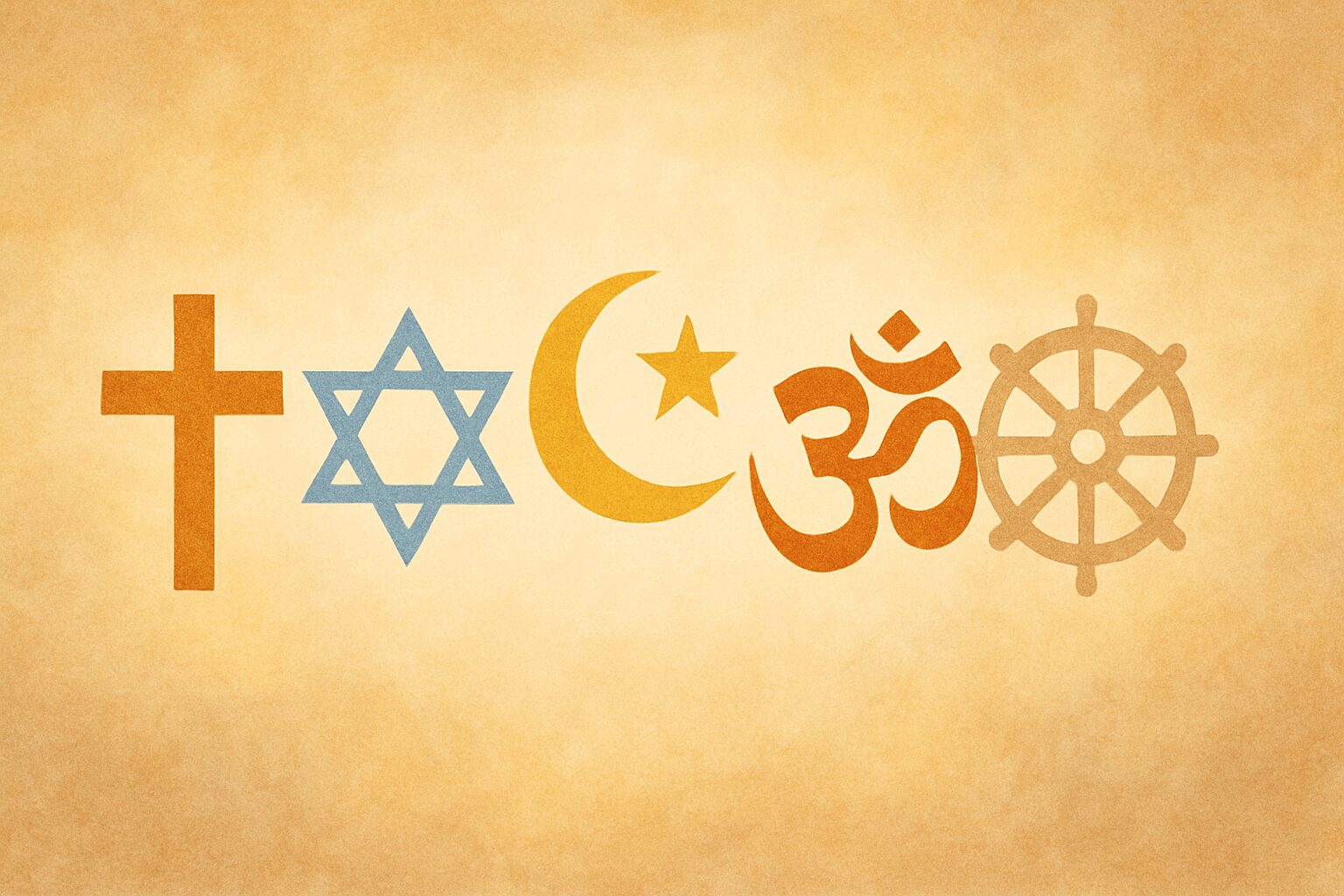Salaamun alaykum, dear readers!
This article is about one of the revelations received from God by Rashad Khalifa.
As it was established in one of this masjid’s foundational articles, the Quran stated in verse 3:81 that the prophets all took a covenant to support a messenger who will come after them, confirming their scriptures beyond a doubt. Verse 33:7 stated that the prophet Muhammad himself took this covenant, thus providing double-confirmation that this messenger is to come after Muhammad.
You can read about him in this article here: Quran Declares: New Messenger After Prophet Muhammad – Masjid at-Tajdeed
Purification and Consolidation of All Religions
In 1989, he mentioned that he received a “new proclamation” from God to convey, that people of all religions must purify, unify, and consolidate their religions into one religion: Islam.
He also said God’s new proclamation is that all who believe in God (regardless of whether one is a Jew, Christian, Hindu, Sikh, or whatever other belief system they practice) will be considered as Muslims if they forget the idols, and devote all worship and veneration to just one God.
He wrote three consecutive newsletters in his “Muslim Perspective” newsletter talking about this new proclamation (the July, August, and September 1989 editions). In those newsletters, here are the names that Rashad calls this proclamation:
- “Divine call to all believers in God”
- “God’s designed and perfectly-timed proclamation”
- “This divine proposal”
- “Divine intervention to save all believers in God”
- “This new proclamation”
- “His invitation to unity”
- “God’s proclamation”
- “Divine plan destined for inevitable enforcement”
- “God’s message of unification and purification”
In short, one does not have to follow or believe in the Quran to be considered a Muslim.
Rather, the bare minimum criteria for being saved from the Hellfire according to this new proclamation that Rashad received is to believe and worship God alone.
That means if one is a Hindu for example, they don’t necessarily have to follow or believe in the Quran. The way they “purify” their faith is that instead of worshipping multiple gods and goddesses, all of their Hindu rituals and worship practices must be dedicated to the one, almighty God alone.
It’s the same thing for Native Americans or people who follow other indigenous religions: they can continue all of their religious practices and worship rituals and ceremonies, but to purify their faith, those rituals and ceremonies must be dedicated to one God, and they must forget their belief in other divine gods and goddesses.
For Christians, they must reject the divinity of Jesus and dedicate their worship rituals (such as the Eucharist for example) to God alone. Instead of thinking of the Eucharist as eating the “body and blood of Christ”, a Christian must think of the Eucharist as an expression of gratitude for God’s provisions, for example, and dedicate the Eucharist to God alone rather than Jesus. If they want to celebrate Christmas, they must stop thinking of it as celebrating the “birth of God the Son” and just think of it as a day of festivity and increased worship, gratitude, and remembrance of God alone.
For Catholics, they must stop praying to saints as intermediaries, and stop believing in the divinity of Jesus, and instead pray to and worship God alone. The religious practices and rituals can remain unchanged, but the object of devotion or dedication must be switched from other deities, saints, and idols, to God alone, in order for the religion to be “purified”.
When the religion is purified, it automatically gets consolidated under the banner of Islam. That’s because Islam is the Arabic term for submission to God one. And if a Christian, Buddhist, or Hindu purifies their faith in this manner, they become Muslim (which in Arabic means one who submits, or a submitter) regardless of what they call themselves, because they are devoting themselves to God alone and submitting to the command of God to purify their existing faiths.
There would no need to be divided any longer as they are our brothers in religion just like those who believe in and follow the Quran. They won’t technically be “Mu’min” (believer, which is a higher category than Muslim) but God will still count them as Muslim because they have purified and consolidated their faiths under Islam by dedicating all acts of worship and devotion to God alone.
So there can be Christian Muslims, Jewish Muslims, Hindu Muslims, Sikh Muslims, and more, as long as they purify their current system of belief by switching their object of worship, veneration, and devotion to God alone.
Of course, following the Quran alone is the easiest, most straightforward path to salvation and with the highest reward, but the Quran allows for multiple paths to salvation, all of which depend on worshipping God alone and doing good deeds for the sake of pleasing God.
Quranic Evidence
Now if you think this is crazy, or nonsense, or you believe that Rashad Khalifa is a madman, then know that the Quran itself already said this 1400 years before Rashad Khalifa existed.
Verses 2:62 and 5:69 plainly says that whether one is a Jew, Christian, or convert, any person whatsoever who believes in God and the Last Day, and does righteous deeds, those will be saved, and they will not have any reason to be afraid or grieve. So these verses are quite self-explanatory.
- Just to clarify, the Last Day is the final day that this worldly life will exist before it is destroyed. So according to verse 2:62, if you believe our current world or universe will keep going forever and not end someday, then your faith in God is impure.
- [2:62] Indeed, the ones who have believed, and the ones who have been Jews, Christians, and converts, whoever believed in God and the Last Day, and did righteous deeds, their reward with their Lord is thus for them; no fear will be upon them, nor will they grieve.
Now some might say, “But verse 2:62 and 5:69 says only those who believe in God will be saved, so don’t you need to believe and follow the Quran to believe in God?”
Not necessarily, because the Quran says that the majority of those who believe in God are mushrikeen (people who make partners with God). A polytheist who believes in God (such as Hindu) is still considered someone who “believes in God” according to the Quran, but their faith is tainted with the act of “shirk” (partnering other idols and deities with God).
Verse 2:62 and 5:69 thus refers only to those who “believe in God” and whose belief is untainted or uncorrupted by belief in other idols and deities, whether Jew, Christian, Hindu, Buddhist, Sikh, or whatever belief system they practice; only those will be saved.
- [12:106] But most of them do not believe in God, except while they are “mushrikoon”. (those who partner others with God)
Therefore, if you believe and regularly worship one benevolent and almighty God alone without other deities, believe in a final judgement day, and live your life as a good person by doing good deeds, then congratulations, you are a Muslim (one who submits himself or herself to God) even if you didn’t realize it all this time, and regardless of whatever label you choose to go by or whatever belief system you are following.
So here is a sample list of those who are considered Muslims, despite having belief systems outside the Quran:
- Unitarian Christians
- Zoroastrians
- Mandaeans
- Practicing Jews
- Sikhs
Monotheist Hindus unfortunately do not yet meet the criteria because Hinduism does not teach a final end to the worldly life. But if they adjust their belief to include the Last Day, then they will meet the criteria in verse 2:62 to be considered Muslims.
Now there is a difference between being a Muslim (submitter) and being a Mu’min (believer) in the Quran.
As you saw in verse 12:106, simply believing in God does not qualify one to be a believer. Many believe in God, but worship other idols or deities besides Him, hence they are not “believers” (mu’min).
So if a Muslim does not follow, believe in, or practice the Quran, their reward in the afterlife would be a lot smaller than someone
To qualify as a believer (and thus receive the most rewards from God), one must believe in all of God’s scriptures (including the Quran), His messengers, His angels, and have such high level of trust that they have no problem doing whatever God commands them in the Quran unquestioningly.
[2:285] The messenger has believed in what was brought down to him from his Lord, as well as the believers. All have believed in God, His angels, His Books, and His messengers: “We do not separate between any of His messengers.” And they said, “We heard, and we obeyed. Forgive us, our Lord, and to you is the destination.”
[49:14] The Bedouins said, “We have believed.” Say, “You have not believed, but instead say, ‘We have submitted (aslam),’ while faith has not entered into your hearts.”
Conclusion
It is very interesting to note how merciful and flexible God is in Islam. There is the age of 40 threshold in the Quran where all who die before 40 years will not be held accountable for being disbelievers (found in verse 46:15 and revealed through the Messenger of the Covenant), God’s consolidation and purification proclamation delivered through the Messenger of the Covenant (and found in verses 2:62 and 5:69).
After all of that, for those beyond the age of 40 who failed to meet the bare minimum and purify their system of faith, God will use one’s personal capacity to determine whether you should be held accountable for not meeting the minimum criteria for salvation (by taking into account your genetics, intelligence, environment, exposure to information, and other circumstances).
Wen taking all of this into account, God makes it very easy for the people to avoid Hell. Now the question is whether the people will take up this chance or not.


Leave a Reply